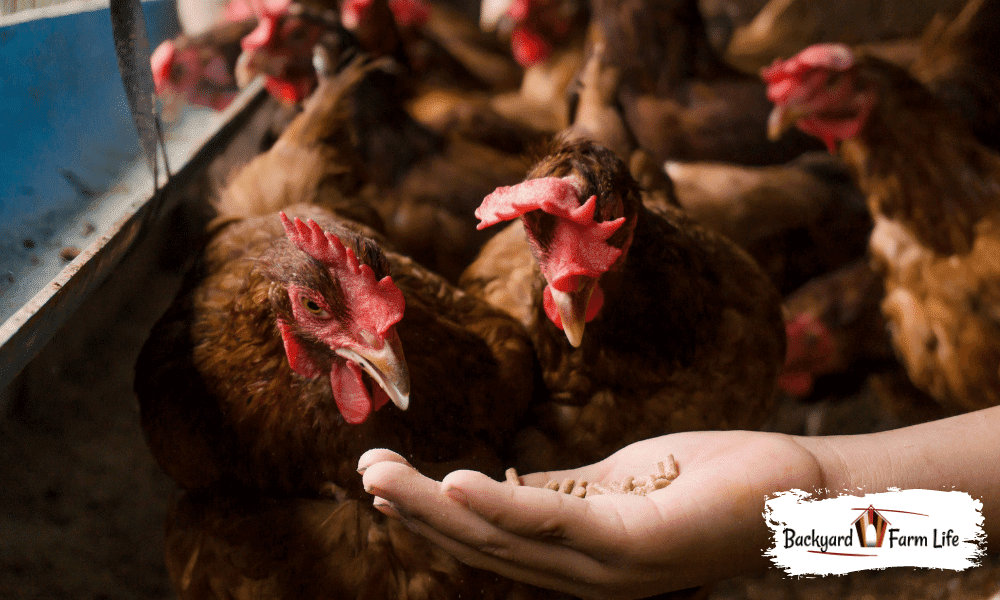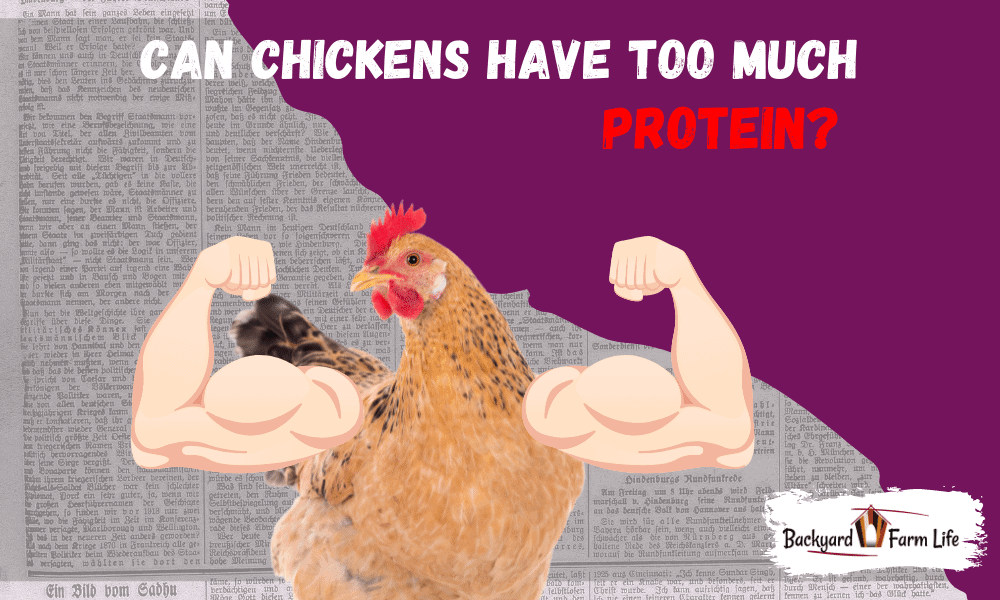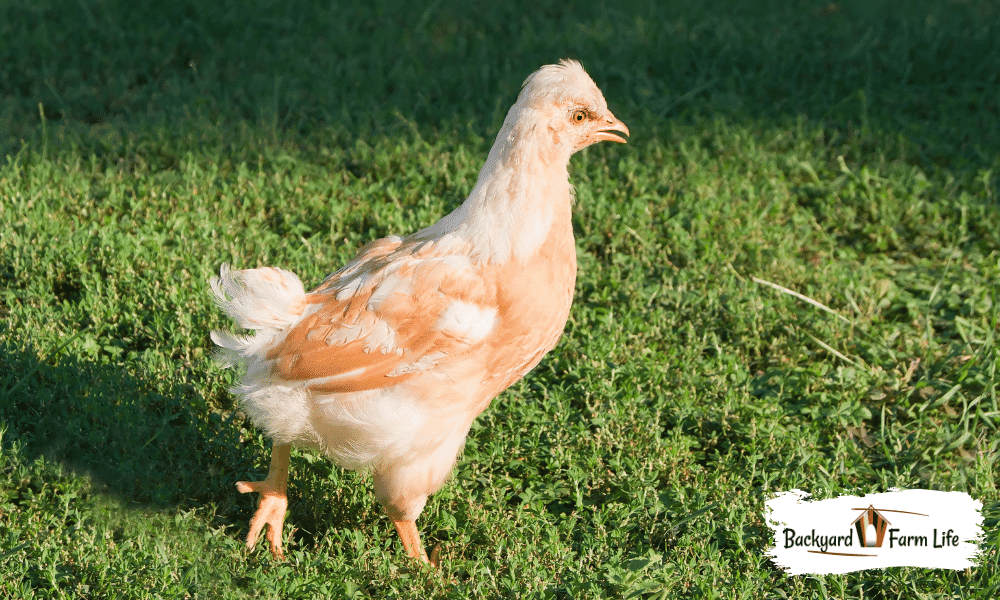The production of a chicken egg is nothing short of a miracle.
I mean, they eat whatever they find in the backyard, mixed with a bit of layer pellets or a seed mix and they pop out delicious eggs time after time.
We know protein is important for chickens and the development of their eggs, but with all these options in the market, 16% protein, 18% protein, layer feed, etc, which one is actually best?
Today’s all about chicken and protein.
Here’s how much protein chickens actually need at every age, 16% vs. 18% protein feed, and whether chickens can actually have too much protein.
–
This blog post does not intend to provide veterinarian advice and should not be taken as such. But its content is based on the information provided by The Veterinary Nurse, and the Department Of Poultry Science at the University Of Georgia.
What Does Crude Protein Mean In Chicken Feed?
When we talk about protein in a chicken feed, it’s referred to as “crude protein”. Without getting too technical, crude protein measures the amount of protein in the feed by means of measuring the nitrogen content.
Not all nitrogen in a chicken’s feed is in the form of protein, so this measure of crude protein tries to account for this. Generally, crude protein slightly overestimates the true protein content in an animal’s feed.
Still, crude protein is a good standardized measure of the protein content of chicken feed and other animal feeds too.
How Much Protein Do Chickens Need?

Diet is critical for a chicken’s health and wellbeing. Immunity and egg-laying. Livelihood and craziness.
A chicken’s diet should be made up of protein, carbohydrates, fats, and of course, vitamins and minerals. Although it’s much more forgiving to have more or less fat and carbohydrates in your chicken’s diet for energy, protein is vital for so many chicken processes.
According to the Department of Poultry Science, laying hens should have between 16-18% protein in their normal daily diets.
This is sufficient for a chicken’s main bodily processes involving the growth and development of their flesh, blood, feathers, skin, bones, and egg production.
How Much Protein Do Pullets Need?
It’s understandable that laying hens need protein to continually develop eggs, but what about younger chickens?
Well, both cockerels (young roosters) and pullets (young hens), from 7-18 weeks old should be having 17% protein in their diets. Which honestly, is about the same as fully grown, laying hens.
The difference here is that pullets aren’t actually using the protein to help develop their eggs as they aren’t old enough to produce them yet!
Instead, young chickens need this high level of protein to continue developing their bodies, bones, feathers, and muscles. A lack of protein (or malnutrition in general), can cause significant delays in starting the egg-laying process.
How Much Protein Do Baby Chicks Need?
Diet is said to be the leading factor behind a baby chick’s healthy development. Generally speaking, the younger the chicken, the more selective you should be with their diet.
When it comes to protein, well that directly fuels the healthy growth of muscles, bones, feathers, and basically every part of a chick’s development.
It’s crucial that baby chicks get between 20-22% protein between the ages of 1-6 weeks.
Most normal chick starters are perfectly formulated to deliver this amount of protein, as well as account for all the vitamins and minerals they need for optimal growth.
If you’re raising baby chicks you should be careful not to feed them table scraps until they are at least 8-12 weeks old. Even then, you should limit it to small amounts of healthy foods. Carrots, bananas, or rolled oats are generally OK for baby chicks.
How Much Protein Do Roosters Need?
Although roosters don’t lay eggs, you should still feed them up to 18%-20% protein in their diets. Roosters are often larger and more muscular than hens, and the extra protein helps them stay strong and fit to protect their flock!
You don’t need to have a separate feed for them either, you can feed roosters layer pellets or other layer feeds just like your hens!
16% Vs. 18% Protein Chicken Feed
So clearly protein is vitally important in a chicken’s diet. But, strangely enough, you’ll find most popular layer chicken feed is either 16% or 18%, so how do you know which to get?
Well, it’s known that extra protein during winter can help chickens keep warm, encourage laying, and stay fit and healthy, so it’s a safe bet to go with 18% here.
But, throughout the rest of the year, is this extra 2% really necessary?
I would say it comes down to you and how you feed your flock. Many chicken owners will supplement their normal chickens feed with healthy table scraps for chickens. This can be a good way to incorporate a variety of macro and micronutrients into your chicken’s daily diet, for health and wellbeing.
If you often give your chickens high protein foods like scrambled eggs or chickpeas, high protein seeds like chia seeds, or mealworms as a treat, then 16% protein feed will offer enough protein for a healthy laying hen.
Just remember, moderation is key, and the main source of food should always be a formulated chicken feed.
Can Chickens Eat Too Much Protein?

Protein protein protein. With all the commercial chicken feeds plastered with how much protein they contain you would think the more the better.
Its true chickens will be able to adjust to slight variations of protein in their diet. Plus a little extra here and there won’t cause harm. But, too much protein can have some very real impacts on your flock’s health and wellbeing.
One such study fed chickens from 22% to 38% protein in their daily diet and found that it lead to much poorer growth and a higher propensity for health issues.
Moreover, too much protein can also have impacts on the yolk of the egg, and dehydrate the chicken more, increasing water consumption.
This overconsumption of water also leads to more watery waste in your chickens which can be extra cleaning for you, and a higher risk of bacterial growth in the coop from more waste.
If chickens regularly consume too much protein it can also lead to renal dysfunction and permanent kidney damage. In most cases, these conditions are incurable in chickens.
Lastly, one true impact of a chicken eating too much protein is that they will often go without eating their normal feed, which contains many nutrients and vitamins essential for a chicken’s immunity, development, and healthy egg production.
How Much Protein Is Too Much For Chickens?
Too little protein is bad, and too much protein is bad, so where do you strike the balance?
Well, it’s known that a little bit of excess protein in a chicken’s diet won’t do harm, as they can simply expel the protein they don’t use as waste.
It’s hard to pinpoint exactly how much protein is too much protein for chickens, but all in all, there’s no need to exceed the 18% recommendation of protein intake for a laying hen. This is one reason why you shouldn’t feed laying hens chick starter too!
Certainly, any diet over 22% protein in chickens would be considered excessive, and anything further you will likely start to notice some impacts on your chicken’s behavior, wellbeing, and health.
Can Baby Chicks Eat Too Much Protein

We all know that baby chicks need their protein to grow up big and strong, but is there such thing as too much protein for baby chicks?
Absolutely.
At such a young age, too much protein can too quickly dehydrate baby chicks and can come with a host of other health complications.
Furthermore, although protein is key in a baby chick’s diet, too much protein will often mean that your chicks will forego other important macro and micronutrients. A balanced approach is a must for optimal health, growth, and development.
Wrap Up
Protein is essential, there are no two ways about it. But, you shouldn’t just pick any old feed and hope for the best. Instead, try to match your chicken’s needs to how much protein they actually need in their daily diets.
Young chicks need more protein for their development, at 20-22% protein. A pullet’s optimal protein lies around 17%, and an adult chicken should consume between 16-18% protein.
Too much protein can cause various issues in your chicken’s health. More than anything, it will also mean your chickens will often forgo enough of other important and vital nutrients they need for their health and wellbeing!
After all, a healthy chook is a happy chook!
